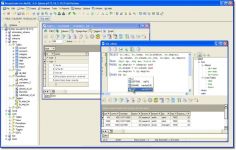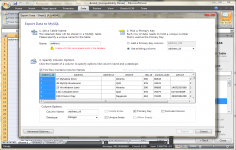 MySQL 5.1.47
MySQL 5.1.47
MySQL AB - (Open Source)
MySQL is a successful open source database used in most web applications, e-commerce and online transaction processing.
MySQL is one of the world's most famous and used open source database. The software can be used to manage web applications, e-commerce and online transaction processing since MySQL database incorporates support those transactions. It is also commonly associated with PHP when it comes to managing websites.
With standard JDBC , ODBC, and Net, the developer can choose the programming language. MySQL has the advantage of working with almost all the popular operating systems and communicate easily with programming languages ​​such as C, C + +, VB, C #, PHP, Python, Ruby, Java, Perl, Eiffel, etc.MySQL replication allows you to create profitable applications. In addition, it enables the development of typologies replication complex and massive chain.Its reliability and robustness, performance, ease of use makes MySQL have more success than anticipated.
- Title:
- MySQL 5.1.47
- File Size:
- 39.1 MB
- Requirements:
- Windows 9x / 2000 / XP / Vista / Windows7 / Windows8
- Language:
- en-us
- License:
- Open Source
- Date Added:
- 19 May 2010
- Publisher:
- MySQL AB
- Homepage:
- http://www.mysql.com
- MD5 Checksum:
- 3EB36A8153E22C5490AD901910337997
# Bugs fixed:
* Important Change: Replication: When invoked, CHANGE MASTER TO and SET GLOBAL sql_slave_skip_counter now cause information to be written to the error log about the slave's state prior to execution of the statement. For CHANGE MASTER TO, this information includes the previous values for MASTER_HOST, MASTER_PORT, MASTER_LOG_FILE, and MASTER_LOG_POS. For SET GLOBAL SQL_SLAVE_SKIP_COUNTER, this information includes the previous values of sql_slave_skip_counter, the group relay log name, and the group relay log position. (Bug#43406, Bug#43407)
* Replication: The failure of a REVOKE statement was logged with the wrong error code, causing replication slaves to stop even when the failure was expected on the master. (Bug#51987)
* Certain path names passed to LOAD_FILE() could cause a server crash. (Bug#53417)
* When reporting a foreign key constraint violation during INSERT, InnoDB could display uninitialized data for the DB_TRX_ID and DB_ROLL_PTR system columns. (Bug#53202)
* InnoDB page splitting could enter an infinite loop for compressed tables. (Bug#52964)
* An overly strict assertion could fail during the purge of delete-marked records in DYNAMIC or COMPRESSED InnoDB tables that contain column prefix indexes. (Bug#52746)
* InnoDB attempted to choose off-page storage without ensuring that there was an “off-page storage†flag in the record header. To correct this, in DYNAMIC and COMPRESSED formats, InnoDB stores locally any non-BLOB columns having a maximum length not exceeding 256 bytes. This is because there is no room for the “external storage†flag when the maximum length is 255 bytes or less. This restriction trivially holds in REDUNDANT and COMPACT formats, because there InnoDB always stores locally columns having a length up to local_len = 788 bytes. (Bug#52745)
* Setting @@GLOBAL.debug to an empty string failed to clear the current debug settings. (Bug#52629)
* A memory leak occurred due to missing deallocation of the comparators array (a member of the Arg_comparator class). (Bug#52124)
* For debug builds, creating a view containing a subquery that might require collation adjustment caused an assertion to be raised. For example, this could occur if some items had different collations but the result collation could be adjusted to the one of them. (Bug#52120)
* Connections waiting for an InnoDB row lock ignored KILL until the row lock wait ended. Now, KILL during lock wait results in “query interrupted†instead of “lock wait timeout exceededâ€. (Bug#51920)
* Locking involving the LOCK_plugin, LOCK_global_system_variables, and LOCK_status mutexes could deadlock. (Bug#51591)
* InnoDB fast index creation could incorrectly use a table copy in some cases. (Bug#50946)
* A syntactically invalid trigger could cause the server to crash when trying to list triggers. (Bug#50755)
* InnoDB Plugin checks to see whether a row could possibly exceed the maximum size if all columns are fully used. This produced Row size too large errors for some tables that could be created with the built-in InnoDB. Now the check is only done when innodb_strict_mode is enabled or if the table is dynamic or compressed. (Bug#50495)
* On Windows, the server failed to find a description for Event ID 100. (Bug#48042)
* For updates to InnoDB tables, TIMESTAMP columns could be updated even when no values actually changed. (Bug#47453)
* If the server is started with --skip-grant-tables, plugin loading and unloading should be disallowed, but the server failed to reject INSTALL PLUGIN and UNINSTALL PLUGIN statements. (Bug#46261)
* Storage engine plugins on Windows could've been built with a definition of time_t which was different from the server expectations. The difference could cause affected plugins to crash. In addition, the use of the time_t type in the storage engine API layer has been enforced. (Bug#39802, Bug#40092)
* When using UNINSTALL PLUGIN to remove a loaded plugin, open tables and connections caused mysqld to hang until the open connections had been closed. (Bug#39053)
* 1) In rare cases, if a thread was interrupted during a FLUSH PRIVILEGES operation, a debug assertion occurred later due to improper diagnostic area setup. 2) A KILL operation could cause a console error message referring to a diagnostic area state without first ensuring that the state existed. (Bug#33982)
Related software
2.1/5 from 178 users


